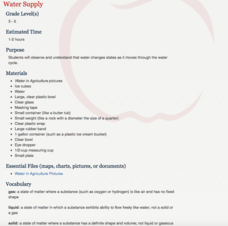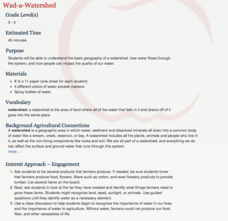United Nations
Compost Monitor Training
What should go in the trash, and what can be composted? Guide your young conservationists through the process of composing their trash with a lesson about the different ways we can dispose of garbage. Using a trash bag with clean...
National Wildlife Federation
Water, Water Everywhere?
Visibly display the location of the water in the world. Using 12 liters of water to represent the total amount of water in the world, the class measures out the water located in different areas, such as the ocean and ice caps. Class...
Baylor College
Animals' Needs
Explore the wonderful world of earthworms as your class learns about the requirements of animal life. After building soda bottle terrariums, students observe worms over the course of a couple weeks, building an understanding that all...
Baylor College
Food for Kids
Immediately capture the attention of your class with the smell of freshly popped popcorn in the sixth lesson of this series on the needs of living things. Young scientists first use their senses to make and record observations of...
Baylor College
Air and Breathing
Blow some bubbles and learn how living things need air in the eighth lesson plan of this series. Young scientists investigate this important gas by observing bubbles and monitoring their own breathing. A simple and fun activity that...
Baylor College
A Place to Be
Home sweet home. Humans, birds, beavers, ants, we all need a place place to rest and keep us safe. In the ninth lesson of this series, the importance of shelter is discussed as the teacher reads aloud the book Tillena Lou's Day in the...
Terminix
The Pollinator
What do bees and children have in common? They both love their sweets. Decorate a flower pot or bucket to look like a brightly colored flower and fill it with wrapped candy and cheese puffs. Have learners reach into grab the candy,...
National Institute of Food and Agriculture
Water Supply
Participate in three activities that look at the earth's limited water supply and the changes water goes through as it enters each phase of the water cycle. The resource is complete with three activities that demonstrate the changing...
Agriculture in the Classroom
Wad-a-Watershed
What kind of impact do humans have on watersheds? Find out in a lesson that defines, explores, and promotes ways to protect our watersheds. The ultimate goal of the lesson is for learners to discover how a watershed is impacted by...
National Nanotechnology Infrastructure Network
Big vs. Little - Macro to Micro Lesson 3
A nanometer is the approximate distance your fingernail grows in one second. Hard to visualize, isn't it? The third of a five-part activity on scale seeks to help learners understand the size of the nanoscale of measurement. Using...
Baylor College
About Air
Give your class a colorful and tasty representation of the components of the mixture that we call air. Pop a few batches of popcorn in four different colors, one to represent each gas: nitrogen, oxygen, argon, and carbon dioxide. The...
Curated OER
Butterfly Life Cycle
Focused little scientists will flitter their arms back and forth across the room with excitement as they learn the life cycle of a butterfly and how living things grow and change over time.
Recycle OK
The Incredible Edible Landfill
Create an edible class model of a landfill using pudding, graham crackers, cookies, and licorice. After making the landfill model, the class discusses what each part represents and answers some other landfill-related questions. Then they...
Baylor College
Needs of Plants
What better way to learn about plant life than by creating a class garden? Young botanists start with a brief discussion about radishes before planting seeds and watching them grow. To determine the importance of water, sunlight, and...
DiscoverE
Oranges and Batteries
Orange you glad you can make circuits using fruit? Young electricians learn about electric circuits and electricity. As part of the lesson, they build a circuit with an orange and then with a banana.
Other popular searches
- Earth Science
- Physical Science
- Life Science
- Science Project
- Science Space
- Environment Science
- History of Science
- Environmental Science
- Pe Science
- Family and Consumer Science
- Consumer Science
- Social Science
















